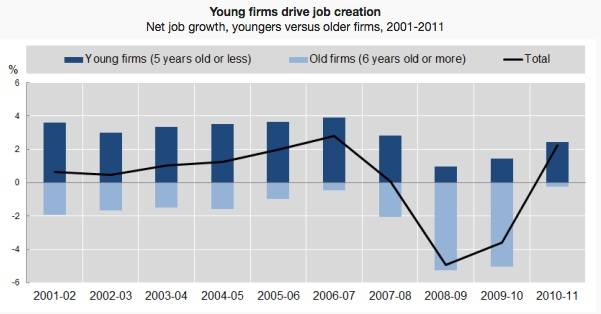During the Great Recession young firms continued creating jobs while most of the growing unemployment was the result of old businesses downsizing, says a new report, “The Science, Technology and Industry Scoreboard 2013”, by the OECD (Organization for Economic Co-operation and Development).
Although young firms have accounted for just 20% of non-financial business sector employment over the last ten years, they have created nearly 50% of all new jobs.
The authors of the report urge policymakers and business leaders to focus more on supporting young firms. By improving laws related to bankruptcy, capital markets, and labor, young firms would thrive even better than they do today, which in turn would accelerate the economic recovery.
At the launch of the report in Istanbul, Turkey, Andrew Wyckoff, OECD Director of Science, Technology and Industry, said:
“Giving dynamic, young firms, like startups, a better chance to succeed will create jobs and boost growth. This new evidence highlights how important young firms are in many countries. Policy makers need to rethink their approach to reforms to help young firms thrive and not overly favour large incumbents who sometimes crowd out these start-ups.”
Reforming bankruptcy laws would encourage young firms to become more innovative. By reducing the constraints imposed by legislation from the highest to the average OECD level, for example, could increase capital flows to patenting companies by approximately 35%.

Young firms and patenting
The authors of the report went over a sample of sixteen member economies and found that young firms represented nearly one quarter of all patenting firms, and applied for about 12% of all patents.
The report shows how the job market in Europe has changed. While demand for lower-skilled jobs dropped by approximately 7% and 20% for managers in 2011 and again in 2012, it rose by 12% for technicians and 50% for professionals during the same period.
During the Great Recession the share of jobs in the service sector continued to increase, eventually reaching 74% of all employment in OECD countries.
The OCED said “Governments should do more to help knowledge-intensive service sector firms thrive and give workers the skills these industries need. Information and technology skills should be emphasised in compulsory education and in training programmes for older workers, says the OECD.”
The Scoreboard monitors trends in industry, technology and science to determine how innovation is evolving and how nations are faring in the global knowledge economy. It includes over 260 internationally comparable quality indicators and provides a wide range of data for other major economies, including the Russian Federation, China, India and Brazil.

